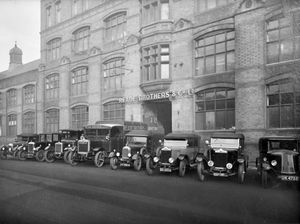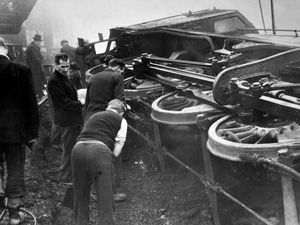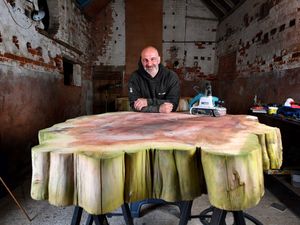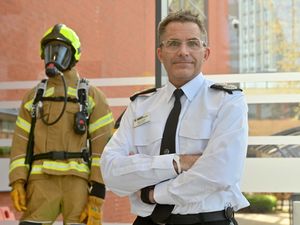Fascinating photos 100 years apart show how scene at medicine firm's Wolverhampton base has changed
Ah, just the tonic... a picture from yesteryear of Reade Brothers & Co, with its fleet of vehicles proudly on show for the camera.

The setting is the company's headquarters in Cleveland Road, Wolverhampton, and judging by the vintage of the vehicles, the photo was taken around the late 1920s.
The firm made a wide variety of products, including medicines, cough mixtures, fruit drinks, and gravy colouring, to name but a few.

We'll leave it to vintage vehicle experts to identify the line-up, and if you can do feel free to drop us a line. But to get you started we'll take a punt that second and third from right are Standards, built by the Standard Motor Company of Coventry.
As you can see, the building, which is now the Dixons' building, is substantially the same nearly 100 years on and lies in an area of the city which is undergoing regeneration.
It is only a stone's throw away from the old Wolverhampton Royal Hospital, which lay derelict for many years but is not being into 38 Wellbeing apartments for over 55s.
As for Reade Bros, the firm was officially wound up in 1999, but in reality was defunct long before then.
The company could trace its history back to the Mander Weaver paint, varnish and manufacturing chemist business established in 1773.
Thomas Reade, the son of a chemist, bought the company in 1866 and for many years it occupied premises in Bilston Street, Cleveland Road and Victoria Street.
The paint and varnish operations were sold to the Mander family while Reade Brothers continued to manufacture a range of well known patent medicines such as Express headache powders, Indian Cerate and Egyptian Salve ointments for chapped hands, cuts and grazes, and Vapomenth Pastilles for sore throats.
The business thrived in the early part of the 20th century and its fleet of vans could be seen across the area.
What did for Reade's was the creation of the National Health Service after the Second World War.
The company was not a big enough operation to provide medicines to the whole of the NHS and could not compete with firms like Boots and Beechams.
As the business declined the main building at Cleveland Road was sold to S J Dixon and Son, the wallpaper and paint business, in 1959.
Much reduced, Reade Bros continued trading at Sharrock Street until the last chemist, a man called Scott, finally retired, and the business ceased trading in 1972.
By the 1960s Reade’s had been reduced to supplying the local corner shops. The firm carried on making boot polish, sweets, veterinary medicines and patent medicines right up until the end in 1972, but the market wasn’t there any more.
Another problem was the formulas for the products. Often they included exotic plant extracts from the colonies and over time some ingredients were banned or simply impossible to get hold of.
The business continued to exist on paper for another 27 years, even receiving its 100th anniversary certificate as a limited company from Companies House in 1994.
The decision was taken in 1999 to finally wind up the company, which administered the last rites to one of Wolverhampton's historic firms.
However, the name of Reade Bros & Co Ltd lives on. Original boxes, jars and bottles have been supplied over the years to local institutions such as the Black Country Museum, Blists Hill Museum in Telford, and to Shugborough.
The building does bear a blue plaque, not commemorating Reade's, but another aspect of the heritage of the site.
The Wolverhampton Civic Society plaque reads: "Forder & Co Ltd manufactured Hansom cabs on this site 1882 - c.1911."





